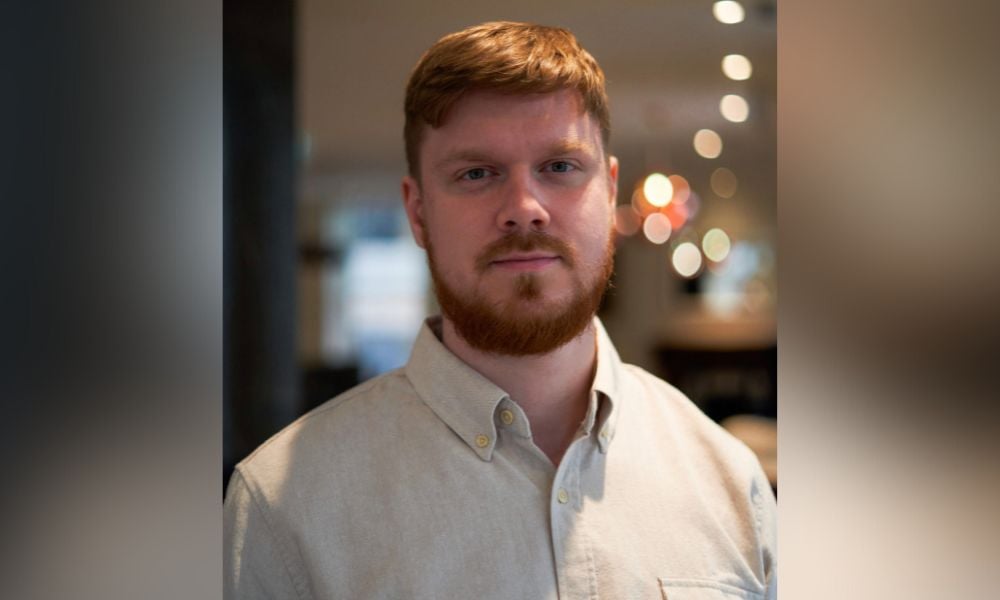
Mykyta Zhukov was in the Dominican Republic when Russia invaded Ukraine

Last February, Mykyta Zhukov was enjoying a holiday in the Dominican Republic with his wife, celebrating their birthdays with “blue ocean, white beach, palm trees and waterfalls.”
But that idyllic vacation was shattered on Feb. 24 when the Ukrainian lawyer specializing in public procurement and litigation started getting emails from friends and relatives saying that Russia had invaded Ukraine. “The first notification from our parents and friends shocked us. We were scared.”
Zhukov, who, in addition to running his law firm, is head of the Ukrainian Bar Association’s committee on constitutional law, administrative law, and human rights, realized that the invasion would forever change his life and career.
And so began an odyssey that took Zhukov and his spouse to Poland, Ireland, and now Canada.
“The first month of the war was especially hard,” he says. “Nobody knew what to do and what to expect.” One of Zhukov’s employees enlisted in the army, another took on volunteer territorial defence and security duties.
As for clients, “some were out of work because their enterprises remained in occupied territory or where there was military activity.” During the first couple of months, Zhukov wasn’t receiving any work or payments from his clients, as many of them had to stop doing business because of the war and the disruption it brought.
Zhukov, who makes monthly donations to help the Ukrainian army, says he decided that it would be “more helpful” if he stayed abroad and found new sources of income while continuing to pay taxes to add to the Ukrainian government’s coffers. He started connecting with his international contacts, and by the time he and his wife moved to Ireland, the work he put into re-establishing his career began to pay off.
“By mid-April, my business activity in Ukraine began to intensify,” he says. “Clients began to make requests, as some of them relocated and returned to functioning fully.” His life was full of constant meetings, zoom calls and messages via LinkedIn and Facebook. He was also impressed with how many of his clients had reinvented themselves with new business opportunities, even during the war. One, for example, started a shooting gallery aimed at Ukrainians who wanted to learn how to fire weapons if the need arose. Another became involved in the solar panel business.
His Ukrainian Bar Association committee work also led to the association signing a memorandum of cooperation with Irish Rule of Law International (IRLI), an organization founded by the Law Society of Ireland, the Bar of Ireland, the Law Society of Northern Ireland, and the Bar of Northern Ireland. The purpose of the memorandum agreement is to promote the rule of law and harness the skills of lawyers in tackling global injustice, inequality, corruption, and conflict. Zhukov also was involved in founding the Association of Ukrainian Lawyers in Ireland.
As part of rebooting his career, Zhukov became an external consultant on public procurement issues with Dublin-based corporate and commercial law firm Philip Lee LLP. “As it turns out, Ukrainian legislation on procurement is very similar to those in Europe,” he says, since Ukraine followed the norms of European laws and regulations. ‘No doubt, there are legislative differences and peculiarities, but the principles are the same.”
Ireland was a haven for Zhukov and his wife, a filmmaker and videographer. “It was green and beautiful, and people were very friendly.” But the couple decided they’d try for a new life in Canada., as they have friends here in Toronto. The couple started applying for Canadian work permits under its new rules for Ukrainian refugees last spring and finally received those documents in August when they settled in Toronto.
Given the ease of doing legal work remotely, Zhukov is still fulfilling his duties with the Ukrainian Bar Association while working on building his business in Ukraine and outside. He also realizes he is facing a new challenge in applying his professional skills in a new country. While he would have to take the relevant courses and exams to become a lawyer in Canada, he feels there are still many ways he could apply his professional skills and abilities, along with his interest in legal technology.
He also wants to be an unofficial “ambassador” for Ukraine, providing information about the country and its people. “I am happy to share my experience in finding new contacts, finding clients, as well as potential forms of cooperation with foreign companies,” he says, adding that his experience could be useful for lawyers of Ukrainian heritage worldwide.
Zhukov continues his networking to build strong contacts that will contribute to the development of Ukrainian businesses, especially around public procurement.
Many of Zhukov’s Ukrainian clients hope to become active participants in foreign public procurement, expanding the geographic range of their business. At the same time, many international companies are expressing their interest in Ukrainian public procurement. Zhukov sees the potential to link the two groups together and give advice to international businesses aiming to participate in public procurement in Ukraine and Ukrainian companies intending to enter global markets.
He believes his international experience and contacts can be “part of the process of rebuilding a new post-war Ukraine.” In communicating with law firms, Zhukov also emphasizes that Ukraine harmonizes its institutions and legal norms with European legislation.
Regarding the war, Zhukov believes that Ukraine will ultimately be victorious, especially as it rebuilds its infrastructure, becoming “one of the most interesting” countries in Europe and the world for investment.
Says Zhukov: “Businesses and law firms that build relationships with Ukraine now will likely see that turn into investment in large-scale projects related to the country’s recovery and reconstruction.”